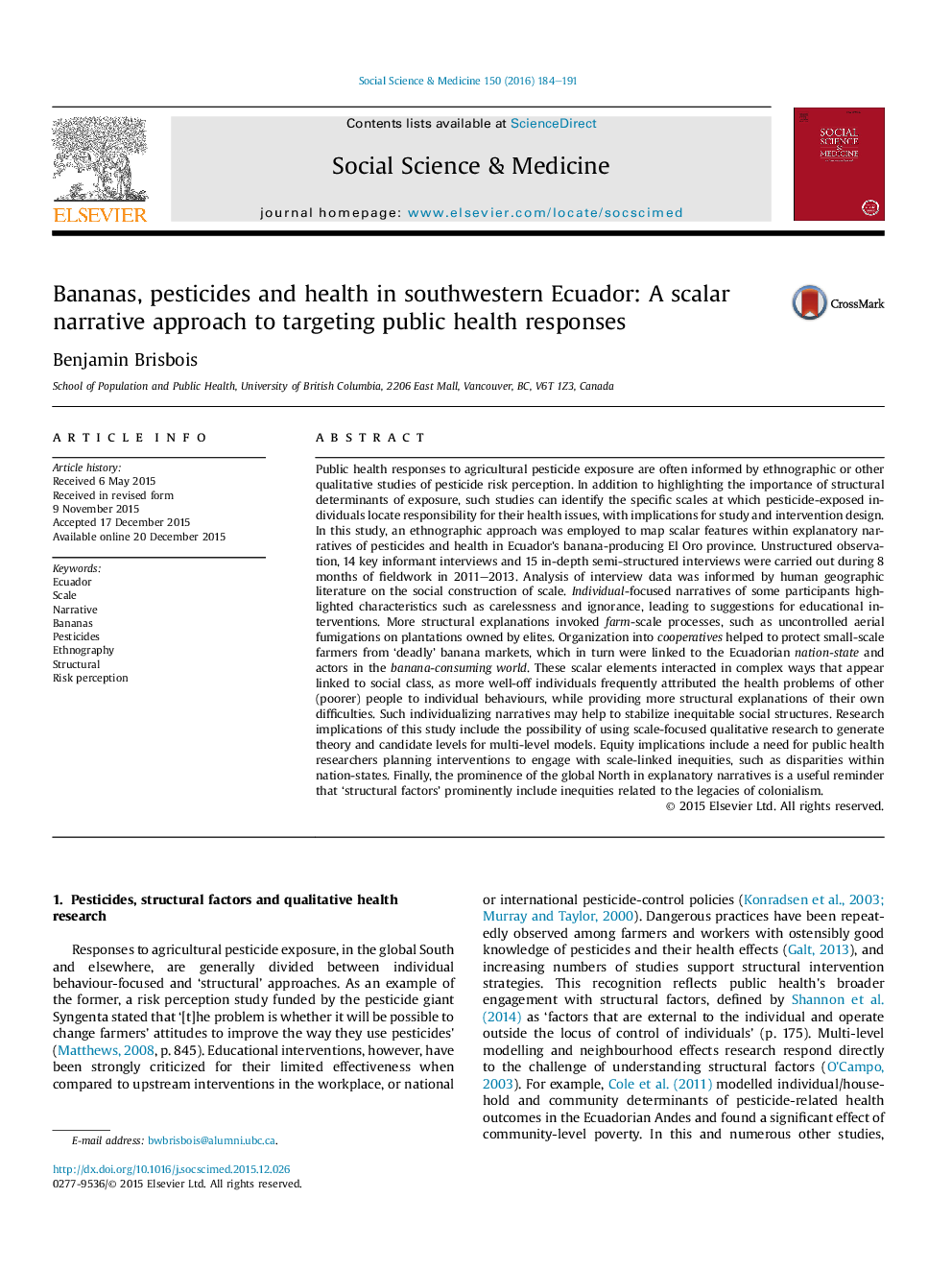| کد مقاله | کد نشریه | سال انتشار | مقاله انگلیسی | نسخه تمام متن |
|---|---|---|---|---|
| 7330906 | 1476019 | 2016 | 8 صفحه PDF | دانلود رایگان |
عنوان انگلیسی مقاله ISI
Bananas, pesticides and health in southwestern Ecuador: A scalar narrative approach to targeting public health responses
ترجمه فارسی عنوان
موز، آفت کش ها و سلامت در جنوب غربی اکوادور: رویکرد روایت اسکالر برای هدف گیری پاسخ های بهداشت عمومی
دانلود مقاله + سفارش ترجمه
دانلود مقاله ISI انگلیسی
رایگان برای ایرانیان
کلمات کلیدی
اکوادور، مقیاس، روایت، موز آفت کش ها، اتنوگرافی، ساختاری، درک ریسک،
ترجمه چکیده
پاسخ های بهداشت عمومی به آفت کش ها کشاورزی اغلب توسط مطالعات قوم نگاری یا سایر مطالعات کیفی در مورد درک ریسک آفت کش ها مطلع می شود. علاوه بر برجسته کردن اهمیت تعیین کننده های ساختاری در معرض، چنین مطالعات می توانند مقیاس های خاصی را شناسایی کنند که در آن افرادی که در معرض آفت کش قرار دارند مسئولیت مسائل مربوط به سلامت خود را با مسائل مربوط به طراحی مطالعه و مداخله تعیین می کنند. در این مطالعه، یک رویکرد قوم نگاری برای نشان دادن ویژگی های اسکالر در داستان های توضیحی آفت کش ها و سلامت در استان مو الآرا استان اکوادور استفاده شده است. مشاهدات بدون ساختار، 14 مصاحبه کلیدی خبرنگار و 15 مصاحبه عمیق نیمه ساختار یافته طی 8 ماه کار تحقیق در سال های 2011-2013 انجام گرفت. تجزیه و تحلیل داده های مصاحبه توسط ادبیات جغرافیایی انسانی در مورد ساخت و ساز اجتماعی مقیاس داده شد. روایت های فردی برخی از شرکت کنندگان برجسته ویژگی هایی مانند بی دقتی و نادانی، منجر به پیشنهادات برای مداخلات آموزشی. توضیحات ساختاری بیشتر، فرایندهای مقیاس مزرعه ای مانند فومیزاسیون هوایی کنترل نشده را در مزارع متعلق به نخبگان به وجود آورد. سازمان به تعاونی ها برای محافظت از کشاورزان خرده پا از بازار موزهای مخرب کمک کرد که به نوبه خود با دولت ملت اکوادور و بازیگران در جهان مصرف موز مرتبط بود. این عناصر اسکالر در شیوه های پیچیده ای که با طبقه اجتماعی مرتبط می شوند، با روش های مختلف ارتباط برقرار می کنند، زیرا افرادی که بیشتر در معرض خطر هستند، مشکلات بهداشتی دیگر (فقرا) را به رفتارهای فردی نسبت می دهند، در حالی که توضیحات ساختاری بیشتری از مشکلات خود ارائه می دهند. چنین روایت های فردی ممکن است به تثبیت ساختارهای اجتماعی نامناسب کمک کند. نتایج تحقیقات این مطالعه شامل امکان استفاده از تحقیقات کیفی متمرکز بر مقیاس برای تولید تئوری و سطح کاندید برای مدل های چندسطحی است. معیارهای سرمایه گذاری عبارتند از نیاز به محققان بهداشت عمومی برای دخالت در نابرابری های مرتبط با مقیاس، مانند تفاوت های موجود در کشورهای مادری. در نهایت، برجسته شدن شمال جهانی در روایات توضیحی، یادآوری مفید است که "عوامل ساختاری" برجسته شامل نابرابری هایی است که مربوط به میراث استعمارگرایی است.
موضوعات مرتبط
علوم پزشکی و سلامت
پزشکی و دندانپزشکی
سیاست های بهداشت و سلامت عمومی
چکیده انگلیسی
Public health responses to agricultural pesticide exposure are often informed by ethnographic or other qualitative studies of pesticide risk perception. In addition to highlighting the importance of structural determinants of exposure, such studies can identify the specific scales at which pesticide-exposed individuals locate responsibility for their health issues, with implications for study and intervention design. In this study, an ethnographic approach was employed to map scalar features within explanatory narratives of pesticides and health in Ecuador's banana-producing El Oro province. Unstructured observation, 14 key informant interviews and 15 in-depth semi-structured interviews were carried out during 8 months of fieldwork in 2011-2013. Analysis of interview data was informed by human geographic literature on the social construction of scale. Individual-focused narratives of some participants highlighted characteristics such as carelessness and ignorance, leading to suggestions for educational interventions. More structural explanations invoked farm-scale processes, such as uncontrolled aerial fumigations on plantations owned by elites. Organization into cooperatives helped to protect small-scale farmers from 'deadly' banana markets, which in turn were linked to the Ecuadorian nation-state and actors in the banana-consuming world. These scalar elements interacted in complex ways that appear linked to social class, as more well-off individuals frequently attributed the health problems of other (poorer) people to individual behaviours, while providing more structural explanations of their own difficulties. Such individualizing narratives may help to stabilize inequitable social structures. Research implications of this study include the possibility of using scale-focused qualitative research to generate theory and candidate levels for multi-level models. Equity implications include a need for public health researchers planning interventions to engage with scale-linked inequities, such as disparities within nation-states. Finally, the prominence of the global North in explanatory narratives is a useful reminder that 'structural factors' prominently include inequities related to the legacies of colonialism.
ناشر
Database: Elsevier - ScienceDirect (ساینس دایرکت)
Journal: Social Science & Medicine - Volume 150, February 2016, Pages 184-191
Journal: Social Science & Medicine - Volume 150, February 2016, Pages 184-191
نویسندگان
Benjamin Brisbois,
